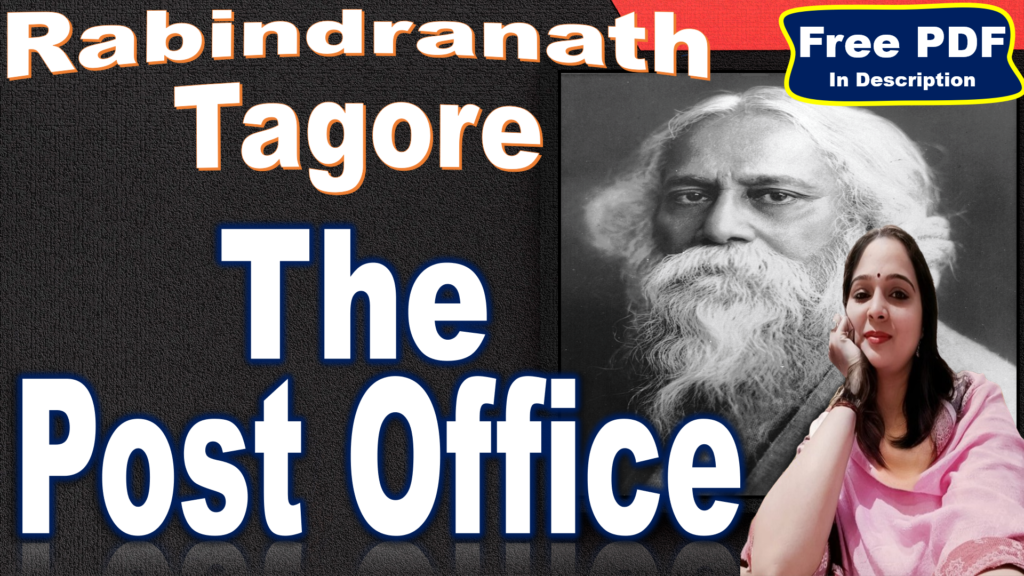
Plot
Act 1:
The play opens with Madhav in conversation with the local doctor, discussing the health of Amal, an orphan boy Madhav has taken in. Madhav expresses his deep affection for the boy and his fear of losing him. The doctor provides comfort and medical advice.
Amal, who resides in Madhav’s home, is bedridden due to a specific fever. The doctor has advised that exposure to the autumn wind and sun could critically affect his health.
Gaffer, a friend of Madhav’s, enters the scene. After a brief exchange of words, Madhav shares that he adopted a child because his wife had always wanted to. Before adopting Amal, Madhav was primarily focused on making money. Now, he spends all his earnings on Amal’s medical expenses with pleasure. Gaffer inquires about the boy’s background, and Madhav explains that the boy is a distant relative of his wife. He lost his mother in infancy and his father recently. Madhav then shares the doctor’s advice to keep the boy away from the autumn wind and sun as his body’s organs conflict with each other. He seeks Gaffer’s support, as Gaffer is experienced in caring for children indoors. Gaffer exits.
Amal enters the scene. He asks his uncle, Madhav, for permission to go outside, but Madhav refuses. When asked why he can’t go outside, Madhav explains that the doctor has forbidden it. Amal expresses his frustration and wishes he were a squirrel or any other animal that could enjoy life without restrictions. Madhav advises him to read many books to become a learned man in the future. But Amal is determined that he doesn’t want to be a learned man; he wants to explore the distant hills and everything around him. Madhav is not pleased with his response. He tells Amal that the hill stands upright as a barrier, signifying that it won’t let him out. Amal, however, sees it differently. He says that the earth raises its hands as it can’t speak, signaling the people who live far away and sit alone by their windows. Madhav criticizes him for his fanciful thinking, telling him that learned men don’t think nonsensically like him. Amal counters him by describing a carefree man he met the day before. The man carried a bamboo staff on his shoulder with a small bundle at the top, a brass pot in his left hand, and an old pair of shoes. He goes without a clear destination, but to search for work anywhere. Seeing that carefree man, Amal says, he also wanted to go up to the stream, but his aunt denied permission assuring him to take up there once he recovers from his illness. But still, he wishes to go about finding things to do like that carefree man. Amal’s concern is that no one takes him out; on the contrary, everyone forces him to stay within four walls.
A dairyman selling curd on the streets stops by Amal’s room at his request. He asks why he has stopped him. Amal replies that he feels homesick and wants to join him since he can enjoy roaming along the streets. But, as prescribed by the physician, he is confined to four walls although he doesn’t know the reason for his confinement as he is illiterate. Amal asks the curd-seller where he hails from. He replies that he is from the village which lies on the Shamli river under Panchmura hills. Amal is intrigued to imagine the astonishing sight of the village with very big old trees and womenfolk in red sarees carrying pitchers home from the river. He admits to the curd-seller that he has never seen his village but he requests him to take him to his village after he gets well. He further adds that he also wants to learn from him to cry curds and shoulder the yoke like him and walk along the road a long way around. He doesn’t want to be a learned man but wants to carry curd along and sell it from village to village. And also wants to learn the tune in which the dairyman cries out for selling curd. The dairyman feels it a pleasure to give the boy some curd free of cost since he has taught him how to be happy selling curd. Money matters a little to him.
After the dairyman leaves, a watchman arrives after hearing Amal’s cry for some curd from his window. He asks the boy what is the noise about. Amal begins to imagine how life would be bliss to be with the watchman as he will take him straight to the king. The bell sound he gongs at proper intervals is like music to hear. Amal likes to hear it when his time comes. The bell strikes when it is midday to have lunch and his uncle has to be back at work after his meal is over and his aunt would fall asleep with Ramayana in hand. His bell sounds to tell the people that time waits for none. Amal imagines flying with time to a faraway mysterious land known to none. A doctor better than this village doctor may come to release him one day from his house arrest and take him to that mysterious land. He asks the watchman when will the great doctor come to untie his fastened wings. But he gets a shut-up call from the watchman. Though he can’t get out from the four walls, when he hears the ding-dong sound of the bell, he feels as if he is taken away to another land.
Amal sees a new big house on the other side where people come and go out and enquire the watchman what is up to there. He says it is a new post office of the King where the letters from the King will arrive. Amal hopes to receive a letter from the King one day as the newly established post office is to dispatch letters from the king for children containing tiny notes. He grows impatient to ask the watchman when he will receive his letter from the King and who will bring the letter to him. The watchman replies that in front of his window, the king has set up his Post Office with golden flags flying high in the building and he has several postmen with a round gilt badge on their chests to dispatch the letter to the recipient. Amal wishes to become the king’s postman when he grows up. The watchman appreciates the boy’s wish to be a postman, though it is a difficult task delivering letters from door to door, it is a needed one. He leaves on seeing the headman afraid if he catches him gossiping with the boy, there will be a great to do then. After he leaves, Amal thinks it would be splendid to receive a letter from the King every day, but who will read them to him? He doesn’t know how to read. Auntie would be busy with her Ramayana. If no one is there to read him the letters, he will keep them safe and read them when he grows up. Then he thinks what will happen if the postman can’t find him as he is confined to his room.
Amal yells at the headman to stop. The headman bursts into the boy and calls him a ‘wretched monkey’. Amal asks him whether the postmen revere him as everybody else does. The headman says that they don’t but obey his command, however. Amal requests him to tell the postmen that he sits by the window so that they would find him easily when they have to deliver his letter from the King. When Amal asks why he is so cross with him, the headman replies angrily that it is his habit, if he wishes, he may even complain to the King that Madhav is a devilish swell, who has made a little pile of monkeys. Amal is displeased with his behavior and tells the headman not to take the risk of sending him the King’s letter. The headman leaves.
Amal tells a girl to stop. She is Sudha, the daughter of a florist, who is already running late for her work and has no time to spare for him. She perceives him as a late-morning star and inquires about his concerns. Amal expresses that she doesn’t wish to stop; he doesn’t care to stay on here either. He is clear about one thing his doctor won’t permit him to go out. She empathizes with his feelings that constantly looking out of the window and observing must make him tired. Also, she advises him to adhere to the doctor’s advice and not to be overly mischievous wishing to be out as people will be annoyed with him. She suggests he close the window, but he declines as only this window is open and all others are shut. He inquires about her identity. She introduces herself as Sudha, the nearby florist’s daughter. And her work is to collect flowers in a basket. He also wishes to be out with her as he can be able to gather flowers from the highest branches right out of sight. He says he knows everything about Champa of the fairy tale and his seven brothers. If he is allowed, he will go straight into the dark forest and bloom as a Champa where the honey-sipping hummingbird hangs at the end of the thinnest branch. On being asked whether she can be his sister, Parul, denies it as she is Sudha, the daughter of Sasi, a florist. It would be a pleasure for her if she could relax like him free from duties. But she has a lot of work every day as she has to weave garlands as many as possible a day. When Amal asks what would be her great times, she says, she is happy with her doll, Benay the bride, and Meni the pussycat. She leaves in a hurry promising to visit him late in the day when she comes back.
Then Amal stops a group of boys off to play. He asks them what will they play. One of them says they are to play at being ploughmen and another boy showing a stick, says that that is their ploughshare. Another boy says they two are a pair of oxen. Amal asks whether they are going to play all day long. The boys affirm that they will be back only at the sunset. The boys invite him to join them. He declines, as it is his doctor’s advice. Amal requests them to play there in front of his window with his dolls which are getting dirty. He also requests them to play in front of his window for some time every day. He can get new dolls for them, once they become old. The boys agree. Then he feels sleepy when he hears the bell sound. Before the boys leave he inquires them whether they know the King’s postmen if they can find him if there’s a letter for him. The boys reply that they will surely find him. As Amal requests further, the boys agree to bring one of the postmen when they come back the next day morning.
Act 2:
The second act begins with Amal retreating to bed as his health deteriorates due to his exposure to the wind while sitting near the window every day.
Amal inquires Madhav if he can approach the window and if the doctor would object if he does so. Madhav refuses permission since being at the window continues to worsen his health. Amal expresses that he might miss Fakir passing the window if he is not there. When Madhav questions who Fakir is, Amal replies that Fakir is his acquaintance and he comes and chats with him about the many lands where he has been, and he loves to hear him. As Fakir is about to pass the window, Amal requests Madhav to bring him in.
Fakir (actually Gaffer in disguise) enters. When Amal welcomes Fakir to sit by his bed, Madhav reveals to him that Fakir is Gaffer. But Gaffer silences Madhav with a strong wink. Amal asks Fakir where he has been this time. Fakir says he has just returned from the Parrot’s Isle. Amal reminds him of his promise to take him along with him as his follower when he recovers from his illness. Fakir reaffirms his promise and also offers to teach him many traveler’s secrets. Madhav is displeased to hear from Amal say that he wants to go along with Fakir. Fakir then describes the Parrot’s Isle which is located in the sea. There are no humans, only birds that sing and fly. It is a land of wonder with green hills on it. No hills without waterfalls, they are fascinating. The waterfalls are like molten diamonds and pebbles sing and dance with the flow of water. The birds would look at him like, he is nothing but a man who is an insignificant creature without wings, inferior to them. Since Amal has already decided to sell curd when he grows up, he doubts whether he will be able to pursue his business among birds and their nests. This again makes Madhav feel uncomfortable. He exits. Then Amal asks Gaffer whether the King has sent him a letter to the Post Office. He replies that his letter is on the way. Amal then explains what he fantasizes about King’s letter. Though Gaffer is not as young as Amal, he can visualize everything Amal describes. Gaffer promises Amal that he will take him to the King once he gets well and declares to ask the King to make Amal his postman. This will keep Amal busy in delivering letters door to door and thereby he will get an opportunity to stay away from home all day long, since he feels staying in the room the whole day makes him feel that the day is much longer than it is. Amal still doubts if he will be able to read the king’s letters. Then Gaffer asks him if it will be enough if it just bears his name.
Madhav enters and criticizes Gaffer for spreading rumors that the King has planted his office there to send messages to both of them. The headman has informed it to the King anonymously. As everything reaches the King’s ears, he warns him to be careful as it will bring ruin to them. Amal asks Fakir whether the King will be cross. Fakir assures him that the King won’t be cross with a child like him and a fakir such as himself. By then Amal reveals that he feels a sort of darkness coming over his eyes since the morning. Everything seems like a dream to him, so he longs to be quiet. Won’t the King’s letter come, Amal inquires. Fakir says that the King’s letter is sure to come.
The doctor enters and asks Amal how he feels today. He replies that he feels awfully well today and all pains seem to have left him. The word ‘awfully well’ makes the doctor anxious. He realizes it is a bad sign. He informs Madhav that it is impossible to hold him much longer and it seems he has got a new exposure to wind. But Madhav assures him that he did his best to secure him. The doctor says that he has felt a peculiar quality in the air, a fearful drought through his front door which is most hurtful. The doctor advises him to keep off visitors at least for three to four days. If it is inevitable let them come by back doors. The Windows should be shut well enough to ensure the sun rays don’t enter the room to keep the patient awake unnecessarily. By then Madhav observes Amal’s eyes are shut up and seems he is sleeping. The headman enters and the doctor leaves saying that he will send a heavy dose which may save Amal.
Gaffer tells the headman to keep his voice down as Amal is asleep. Amal rises from bed, however, and says that he can hear everything including a faraway noise. He feels like his mother and father are sitting by his bed and speaking to him. The headman mockingly informs Amal showing a blank paper that this is a letter from the King which says that the King visits him shortly. Amal hopes that he will receive his letter from the King, so he is ready to wipe the dust off his feet. The gong of the watchman is heard and the evening star shows up but can’t be seen from inside as all windows are shut up. A knocking at the door is heard and the King’s Herald enters to announce that the King is coming that night at the time of the second watch. He also informs that the King sends his greatest physician to attend to his young friend. The Royal Physician enters and opens all the doors and windows of Amal’s room. Amal feels extremely well and sees all the stars now twinkling from the other side of the dark. Amal is ready to leave when the King visits him and asks him when he will come to find the polar star. Amal requests the Royal Physician to permit the headman to stay with him as he is the friend who brought the King’s letter to him. Madhav whispers to Amal to ask for a gift when the King visits him. Amal says that he has made up his mind to ask the king to make him his postman so that he can wander around far and wide, delivering the King’s message door to door. Amal asks what will be their gift to the King. The Royal Physician silences everyone as sleep comes over to him. He asks the oil lamps to be blown out so that only the starlight may stream in. Madhav becomes nervous and asks Gaffer why are they darkening the room and how will starlight help. Gaffer tells him not to disbelieve things anymore.
Sudha enters calling for Amal. The physician says he is asleep. Sudha requests to allow her to give some flowers to Amal’s hand. She asks the physician when will he be awake. The physician says that he will be when the king directly comes and calls him. She requests the physician to whisper into Amal’s ears that she hasn’t forgotten him and she has come as she promised him earlier that day, not realizing that Amal is dead.





